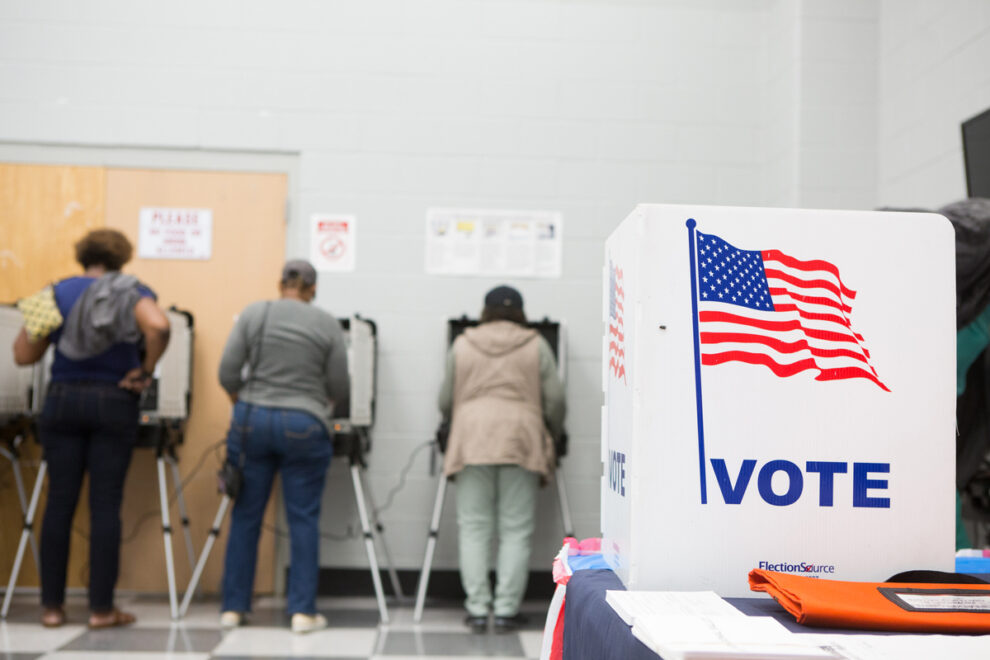Kansas will have a presidential primary next March, using up to an estimated $5 million in an attempt to garner more turnout for Kansas’ political parties than usually received through the traditional caucus.
Gov. Laura Kelly announced the signing of House Bill 2053 Friday, along with four other pieces of legislation.
Republican Secretary of State Scott Schwab voiced support of the primary bill but called on lawmakers to help local officials pay for the cost of administering the election.
“Enactment of the presidential preference primary bill signifies the trust party leaders have in the integrity of Kansas elections,” Schwab said. “We are asking the Legislature to fully fund this measure. Our county election offices will be ready to conduct a fair and secure election.”
Others in his party have repeatedly cast doubt on election security. Republicans in the Legislature pushed for several pieces of voting restrictions under the false pretense that illegal ballots are at risk of being counted.
The presidential primary bill passed 86-32 in the House and 28-12 in the Senate after several lawmakers reversed their positions.
The election will come at a moment of political upheaval. President Joe Biden is expected to run for reelection, but the emerging Republican presidential candidate could be less clear-cut, with both Florida Gov. Ron DeSantis and President Donald Trump expected to run. In the last Republican presidential caucus, in 2016, Ted Cruz outperformed Trump.
The primary is expected to provide Kansas’ political parties with higher voter turnout rates, though some have expressed concern that the primary will be expensive and confusing to voters who are used to the caucus system. Kansas hasn’t held a state-run presidential primary in decades.
Election officials have estimated the cost would be about $4 million to $5 million for the one-time primary. The presidential primary will be held March 19, 2024, and candidates will either pay a $10,000 filing fee or submit 5,000 registered voter signatures to be considered eligible.
Legislative pay
Kelly also announced the signing of Senate Bill 229, a legislative pay adjustment proposal meant to remedy years of stagnant wages and make legislative careers more accessible.
The bill, which passed 76-46 in the House and 25-8 in the Senate, establishes a nine-person commission that will come up with compensation rates for state officials. The first round of compensation rates and salary will be decided on by Dec. 1, 2023, and implemented in the 2025 legislative session, with rates set to be readjusted every four years.
State legislators currently get paid a base salary of $88.66 for every day during the session, a salary that hasn’t changed in about 20 years. Lawmakers also earn a subsistence of $157 per day while in session. From April through December, lawmakers receive $354 every two weeks to cover constituent-related expenses.
Another part of the bill would readjust compensation for some state officials, judges and elected district attorneys.
Housing
Senate Bill 17 updates the Kansas Reinvestment Housing Incentive District Act. The legislation will expand the program statewide and provide incentives for affordable housing projects.
“The best way to grow the economy is to make sure our workforce has access to affordable housing,” Kelly said. “After landing some of the largest economic development projects in our state’s history, we must have the resources in place for workers to fill those roles, and that means making sure we have accessible housing in every corner of the state. I am pleased the Legislature came together to address this need for Kansans to keep our economy growing.”
The legislation passed the House 63-59 and the Senate 31-9.
“To retain and attract a skilled workforce and continue Kansas’ growing economy affordable housing options are necessary,” said Sen. Rob Olson, an Olathe Republican. “I am pleased with the Legislature’s work and Governor Kelly signing this bill as it will bring additional development and construction jobs and housing options across the state.”
Kelly also signed legislation updating procedures for settlement agreements involving minors and legislation updating several business codes and statutes.
Source : Kansas Reflector





































